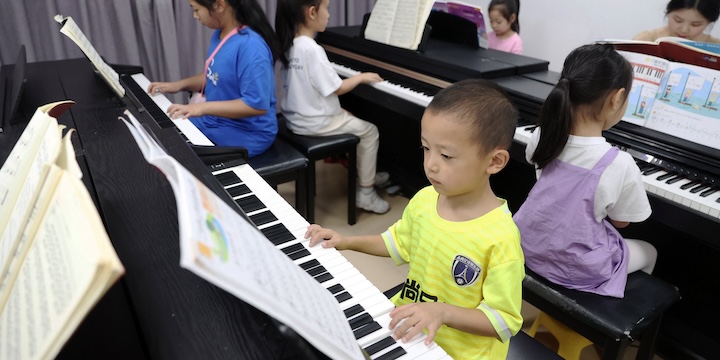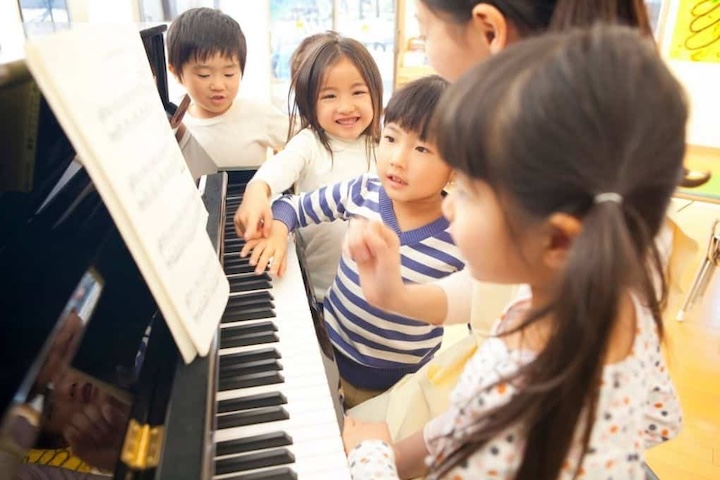The Well-Tempered Ear
Is piano-mania in China fading?
Leave a Comment
PLEASE HELP THE EAR. IF YOU LIKE A CERTAIN BLOG POST, SPREAD THE WORD. FORWARD A LINK TO IT OR, SHARE IT or TAG IT (not just “Like” it) ON FACEBOOK. Performers can use the extra exposure to draw potential audience members to an event. And you might even attract new readers and subscribers to the blog.
By Jacob Stockinger
You have probably heard of piano superstars Lang Lang and Yuja Wang. Maybe even of prize-winners Yundi Li and Haochen Zhang, who both won the Van Cliburn competition while in their teens.
The Ear recently read where there are more piano students in China — the People’s Republic of China — than in Europe, North America and South America combined. In 2019, one music website estimated that “over 40 million Chinese kids are studying the piano today, with some sources going as high as 50 million.”
How did this piano phenomenon come about?
As Bloomberg news recently reported: “China’s love affair with the piano goes back several decades. During the Cultural Revolution of the 1960s, the instrument was condemned as a symbol of the bourgeoisie. But thanks to the economic reforms and the country’s opening up, the piano became an affordable luxury for a quickly expanding middle class.” (Is it a similar story in South Korea, which has produced many outstanding pianists and winners of international competitions?)
That sounds familiar — similar to what happened in Western culture as the middle class expanded and Hausmusik for amateur musicians took hold. It was a time when most middle-class households had a piano. But now that is fading in the West. Check out all the used pianos listed for sale on Craig’s List and other places.
For more detailed background about about the role of pianos and classical music in China, see this 2019 post by Ludwig-Van.com:
But now news reports say China’s economy is headed for hard times.
What does that mean for piano-mania in China?
Maybe the same thing that has happened in Europe and the United States?
Here is an updated story from another source that says the Chinese piano craze is playing itself out:
https://www.sixthtone.com/news/1014703
Do you have an opinion about China and its love affair with pianos and Western music?
About the fate of pianos and piano lessons in the West?
The Ear wants to hear.
Tags: #Middle-Class, affordable, amateur, amateur musicians, Arts, Asia, asian, audience, Bach, Beethoven, blog, Bloomberg, bourgeoisie, Canada, Chamber music, children, China, Chinese, Classical music, Competition, composer, Concert, concerto, Craig's List, craze, Cultural Revolution, economic, economy, Europe, Facebook, fad, German, Germany, Haochen Zhang, hausmusik, instrument, international, Jacob Stockinger, Johann Sebastian Bach, kids, Korea, Korean, Lang Lang, link, Love, love affair, Ludwig van Beethoven, Luwig-Van.com, luxury, Madison, mania, Mozart, Music, music students, news, North America, online, pianists, Piano, piano lessons, post, PRC, reforms, report, share, Sixth Tone, Sonata, source, South America, South Korea, South Korean, symbol, tag, Taiwan, Taiwanese, The Ear, Toronto, United States, University of Wisconsin-Madison School of Music, University of Wisconsin–Madison, used pianos, Van Cliburn, Van Cliburn International Piano Competition, Website, Western culture, Western music, winner, Wisconsin, Yuja Wang, Yundi Li
Classical music news: Chinese pianist Yundi Li leaves EMI and returns to Deutsche Grammophon as his home recording label, according to the Wall Street Journal.
2 Comments
By Jacob Stockinger
There is good news to report on the recording front.
As of last Friday afternoon, the Hong Kong-based Chinese pianist Yundi Li (below) – at 18 the first Chinese pianist and the youngest person ever to win the International Chopin Competition in Warsaw (he did it back in 2000) – has left EMI and returned to Deutsche Grammophon.
Here is a link to a story in the Wall Street Journal:
http://online.wsj.com/article/SB122790914204065299.html
And here is another link to an Asian site:
http://www.asiaone.com/News/Latest%2BNews/Showbiz/Story/A1Story20120507-344346.html
This is good news because he was let go by Deutsche Grammophon when his superstar Chinese compatriot and competitor Lang Lang (below) was the big seller and demanded that Li be let go because Lang-Lang felt there just wasn’t room for two Chinese pianists at DG.
Then of course the best-selling and flamboyant Lang-Lang – nicknamed Bang Bang by some critics — sold out to Sony Classical that had gone shopping for him with a black check. He reportedly settled for a payment of $3 million – during a time when record companies were general cutting back on new releases and in-house artists.
So Li when to EMI, the British label that has had major financial problems recently.
For EMI, he changed his name simply to Yundi and recorded the complete Chopin nocturnes as the first installment of complete Chopin project that never materialized. He then recorded a live recital, with lots of Chopin and some Liszt, in Beijing; then he came up with an all-Chinese recital. All of the seemed like let-downs to The Ear.
Clearly, he seemed headed – steered, should I say — on the path to being the Lang Lang of EMI.
The charismatic and deeply musical Li deserved better than that. And now he has it.
I have yet to see an official announcement from DG or its parent company Universal, so I don’t know whether he will retain how new single name Yundi – which seems too precious and gimmicky — or return to Yundi Li, as I would like to see. (Similar to the way the punky British violinist Nigel Kennedy, below, went by the moniker Kennedy for a while and then came to his senses and returned to Nigel Kennedy.)
According to industry watchers and insiders like British journalist and critic Norman Lebrecht, for DG Li will record first popular Beethoven sonatas (the “Moonlight,” “Appassionata” and the “Pathetique”) and then Beethoven concertos for DG.
That is a significant expansion of his repertoire and reputation, though his CD for DG of a recital in Vienna suggests those choices will be just fine. Nonetheless, it will be interesting to see the results and should mark a major course change for the better in his career. I hope his programs and recordings become more exploratory.
Anyway, The Ear sends out Congratulations to Yundi Li, to Deutsche Grammophon and to all piano fans.
Tags: Chopin, Deutsche Grammophon, EMI, Frédéric Chopin, Hong Kong, KENNEDY, Lang, Nigel Kennedy, Norman Lebrecht, Yundi Li








